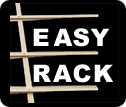Warehouse Shelves & Shelving Systems
 Most companies realize they need new warehouse shelves when they run out of space and are facing an imminent move. In many cases the move is not necessary because plenty of space still exists within the facility. Poorly organized supplies, materials, and products can quickly fill a room with clutter, creating the perception that space is limited when it really is not. Both floor space and vertical cube space often go wasted, unnoticed as to the potential they represent.
Most companies realize they need new warehouse shelves when they run out of space and are facing an imminent move. In many cases the move is not necessary because plenty of space still exists within the facility. Poorly organized supplies, materials, and products can quickly fill a room with clutter, creating the perception that space is limited when it really is not. Both floor space and vertical cube space often go wasted, unnoticed as to the potential they represent.Warehouse shelving will convert this horizontal and vertical space accordingly into highly organized compartments of efficiency. Products and supplies can then be sorted and stored by category, type, size, or material build, making it easier to maintain track of inventory in the process. Knowing exact counts of crates, boxes, parts, products, and raw materials is the best way to avoid over purchasing, and accurate inventory records also play a very big role in tax valuation at the end of each quarter.
Sometimes sensitive materials like certain chemicals need their own special storage area for safety reasons. They require certain temperatures and a certain level of ventilation to remain stable indoors. Smaller warehouse shelves can be placed in these areas and used to store these substances with minimal hazard to employees and the environment.
Warehouses that see a lot of shipping and receiving activity perhaps benefit the most from shelving units. When trucks and forklifts are rapidly loading and unloading supplies it is vital to stay on top of process flow. The organization that warehouse shelving offers such an operation can mean the difference between staying on schedule or falling behind and having to make up the difference during costly overtime.
The type of warehouse shelving used in a specific environment depends a great deal on the weight of the load it is supporting and the method of retrieval workers used to access materials on the shelf. Different sized industrial shelving units are used in specific environments. The strength of the shelf will to a certain extent determine what can be stored on it.
Workers who need to quickly retrieve small parts or boxes will have a much easier time working with open backed warehouse shelves because they can access these units from the back and the sides as well as the front. Smaller open backed shelves are also used by office managers to store office supplies and documents.
Parts storage is commonly done by adding plates to the shelves inside closed back units. This creates bins that small components can be stored in. 18 gauge and 20 gauge closed back warehouse shelves that can easily support 400-450 lbs in weight are routinely used for storing boxes in stockrooms. They can also be connected together to create box shelving systems that can hold up to 2,000 pounds in weight.
For storage of loads totaling over 2,000 pounds in weight, we recommend long span warehouse shelving. Long span systems, or wide span as they are also known, can convert entire walls into storage areas and can support loads of up to 35,000 pounds. Wide span units are designed with a unique two-piece steel beam support that increases the unitʼs center of gravity and more evenly distributes heavy loads over the surface of the shelves.
Easy Rack carries a wide variety of custom made shelving, commercial shelving, material handling equipment, commercial lighting, used pallet racks, and modular prefab buildings installed nationwide. If you can not find what you are looking for call us toll free at 1-888-776-3720 and we will find it for you.
We are positioned in Houston, Texas with regional distribution arms located throughout the United States that enable us to service all 50 states including New York NY, Los Angeles CA, Miami, FL. Chicago, IL. Denver CO., New Orleans, La., Cleveland, Ohio, Kansas City, Mo., Mesa, Arizona, Virginia Beach, Va., Omaha, Nebraska, Oakland, California, Miami, Florida, Tulsa, Oklahoma, Minneapolis, Minnesota, Colorado Springs, Colorado, Arlington, Texas, Beaumont, Texas, Denton, TX, McKinney, Texas, Midland, TX, Killeen, Texas, Dallas TX, San Antonio, TX, Austin, TX, ALBQ, NYC, LA, MPLS, DFW.
Labels: Commercial Shelving Systems, Houston Texas Used Shelving, Long Span Industrial Shelving, Used Storage Racks and Shelving, Warehouse Shelves




